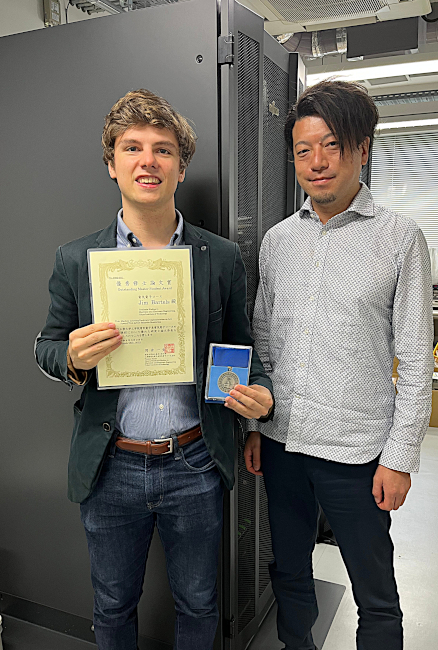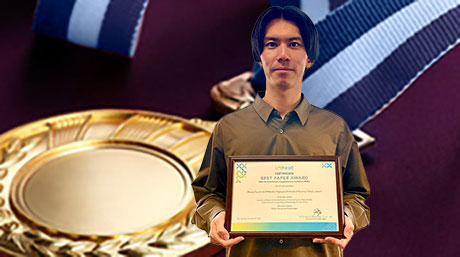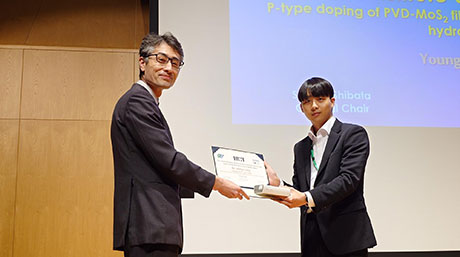Electrical and Electronic Engineering News
2021 Outstanding Master Student Award - Jim Bartels (Hiroyuki Ito Laboratory)-
Machine learning Implementation on Low Power FPGA for Cow Behavior Monitoring
Thirteen out of about 140 Electrical and Electronic Engineering students presented excellent master thesis and received this award. Interview with the winners.

Jim Bartels (left) and Associate Professor Hiroyuki Ito (right).
The server in the background is used for computation during research.
What is the content of your research and how do you expect it to benefit the world?
The Nano Sensing Unit performs interdisciplinary research mainly on hardware technologies including wireless circuits, MEMS sensors and cow behavior monitoring on edge devices. During the research for my master’s thesis, I created a tiny machine learning algorithm, called TinyCowNet, that can estimate cow behavior distribution at a high accuracy from accelerometer data on programmable digital hardware. Providing information to farmers about whether a cow is eating enough grass, taking sufficient rest or ruminating among others, presents a good indication about the health of cows. This can improve farm efficiency and lead to detecting early signs of diseases or oestrus. As cows cause the majority of greenhouse gas emissions in the livestock industry and a significant part of global emissions, we think it is important to be able to provide such information as it could reduce their environmental impact.
Sending accelerometer data from a hardware device attached to a cow's neck and estimating distribution with machine learning algorithms on the cloud is costly. This is because the amount of data that has to be wirelessly transmitted to the cloud from the device is large. Therefore, such systems require large batteries or have minimal battery life, increasing the costs for farmers to adopt. Instead, during my research I optimized a recurrent neural network to minimize the amount of trained weights and maximize accuracy so that this algorithm can be implemented on an edge device itself. This allows the reduction of transmission data and therefore lower power consumption. Furthermore, I quantized this network to only use integer numbers, further reducing the required computation to estimate cow behavior from accelerometer data. With these methods I created a network that can estimate how much time a cow is resting, eating, moving or ruminating at an accuracy of 95% with possible battery lifetimes of over 2 years when implemented on a cow edge device using off-the-shelf digital hardware such as an FPGA. We believe this will allow farmers to improve cattle welfare and farm efficiency in the future at lower costs.
After performing my research, I became fascinated by the fact that AI can be used for applications that help mitigate climate change. As climate change is becoming an increasingly concerning global issue, I am motivated to apply my knowledge and search for new applications with the same effects in the future. Moreover, my research was highly interdisciplinary, exposing me to many different fields including animal science, computer science, electrical engineering and agriculture. It provided me with an overview of the societal impact and technical details of an entire system, changing my worldview and philosophy as an individual. I highly recommend taking such an interdisciplinary approach. The above research was recently published in an international journal.
Comments on the award
I am very honored and grateful to receive this award. I would like to thank all the professors, students, collaborators and family for supporting me and providing guidance throughout my time as master student at Tokyo Tech. This award serves as a great encouragement to continue my endeavors as a researcher.
When I joined Ito Lab, I did not have any knowledge about cow behavior, neural networks or agriculture. The freedom in my laboratory allowed me to come up with my own ideas and gave me great motivation and passion as an early academic. Also, it forced me to study many different fields and required me to form my own opinion and philosophy. I think this is an essential skill. I have also learned a lot by staying in Japan and experiencing Japanese culture and its people. It has given me a lot of insights about the world and made me experience it from a different viewpoint. I think that the rich experiences during my master’s have given me an excellent preparation for my future as an academic within multicultural environments and currently as a PhD student at Tokyo Tech. Lastly, I want to express my sincere gratitude to Prof. Hiroyuki Ito, Prof. Ludovico Minati and Prof. Korkut Kaan Tokgoz for all the opportunities that they have provided me.




